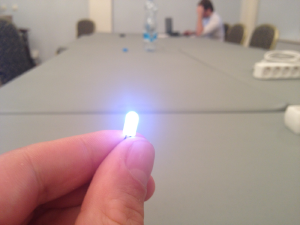Lecturer: Mindaugas Gapševičius
Credits: 6 ECTS, 4 SWS
Date: Tuesday 17:00 - 20:00
Venue: Marienstraße 7b, Biolab (Room 202)
First meeting: Tuesday, 11th of April 11:00 - 15:00
Block seminar: 17-19th May
Deep brain neurostimulators, retinal implants, implantable neural electrodes, muscle implants, etc. belong to the interfaces between living tissues and artificial human-made implantable devices. Although these devices might still sound being from the series of fantasy they are reality in the contemporary medicine.
This course is designed as an introduction to work with interfaces between living organisms and machines. The weekly seminar is divided into theoretical and practical parts. During the theoretical part, we will discuss artworks in relation to bioelectronics, also will take a look into contemporary discourses around biosemiotics and media theory. The practical part will involve work with organisms, electronics and computers. Participants will be introduced to the free, open source, and cross-platform Pure Data visual programming language. The biosemiotics part will be introduced by Dario Martinelli during the block seminar.
Living and non-living systems will be considered while sensing and recording their shifts with the help of sensors, sonifying, visualizing and analyzing their behavior. Participants will be encouraged to work on their individual projects, which at the end will become a part of the exhibition foreseen in summer in Berlin.
Application
Please send a motivation letter before April 8th, 2016 to mindaugas.gapsevicius [ät] uni-weimar.de
To: mindaugas.gapsevicius [ät] uni-weimar.de
Subject: Bioelectronics, aesthetics and other interesting things /// Application
Content:
- Your motivation to join the course
- Name, Surname
- program and semester (Studienprogramm und Fachsemester)
- matriculation number (Matrikelnummer)
- Valid email address @uni-weimar.de
Block Seminar
Dario Martinelli: A seminar on bio- and zoosemiotics
17-19th May
Despite their popularity within the semiotic environment, biosemiotics and zoosemiotics are still surrounded by a certain curiosity, the kind of curiosity that manifests itself in attitudes like scepticism and ‘exoticism’. At the same time, there is a growing interest not only about bio- and zoosemiotics, but also about the whole area of the “non human”. Finally, after decades of prejudices, this area caught the interest of cognitive sciences, human sciences (is it still fair to call them just human?), art research, and more generally are now also approached according to a wider perspective. more
Syllabus
overview, interfaces. 12.04.2016
- biosensors
- microcontrollers
- computers
Pure data. 19.04.2016
Plant sensing. 26.04.2016
- Martin Howse circuit
- Leslie Garcia circuit
Slime molds sensing. 03.05.2016
- Theresa Schubert & Andrew Adamatzky experiments
Bacteria sensing. 10.05.2016
- RIXC/Rasa and Raitis Smits
A seminar on bio- and zoosemiotics. 17-19.05.2016 (block seminar / with Dario Martinelli)
Extra low voltage circuits. 24.05.2016
- Human battery
- Bacteria battery
Work on individual projects. June
